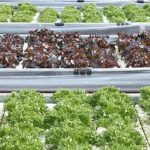Diatomaceous earth, a natural insecticide, is safe for vegetable gardens. It is composed of the fossilized remains of diatoms, a type of hard-shelled algae. Diatomaceous earth is widely used in gardening for its ability to control pests without harmful chemicals. In this article, we will explore the myriad benefits of using diatomaceous earth in vegetable gardens and provide practical guidance on its safe application.
Diatomaceous earth is known for its high porosity and abrasive properties, making it an effective solution for controlling pests such as slugs, ants, and aphids in vegetable gardens. Its microscopic sharp edges irritate and dehydrate insects, effectively eliminating them from the garden. Additionally, diatomaceous earth is non-toxic to humans and pets, making it an ideal choice for organic gardening practices.
Understanding the composition and properties of diatomaceous earth is crucial for its successful use in vegetable gardens. We will delve into the details of how diatomaceous earth works as a natural insecticide and explore its other beneficial properties for soil health and plant growth.
Additionally, we will discuss safety precautions to ensure that gardeners can handle diatomaceous earth effectively without any adverse effects. Join us as we uncover the potential of diatomaceous earth in promoting thriving vegetable gardens while maintaining safety standards.
Understanding Diatomaceous Earth
Diatomaceous earth is a natural product that is made from the fossilized remains of diatoms, which are a type of hard-shelled algae. It is commonly used in gardening and agriculture due to its unique properties. Diatomaceous earth is composed of silica, which gives it a powdery texture and makes it effective as a pesticide, soil amendment, and natural insecticide. Its abrasive nature also makes it an effective tool for controlling pests in vegetable gardens.
The main component of diatomaceous earth is silicon dioxide, also known as silica. This compound is what gives the diatomaceous earth its abrasive texture and makes it effective against pests. When insects come into contact with diatomaceous earth, the particles attach to their exoskeletons and absorb the oils and fats from their outer layer, ultimately causing them to dehydrate and die.
One of the key properties of diatomaceous earth that makes it safe for use in vegetable gardens is its non-toxic nature. Unlike chemical pesticides, diatomaceous earth does not pose a threat to humans, animals, or beneficial insects when applied correctly. It targets only the pests that come into contact with it, making it an environmentally friendly option for pest control in vegetable gardens.
When applying diatomaceous earth in vegetable gardens, it’s important to follow some safety precautions to ensure proper usage. Here are some tips for safely handling diatomaceous earth in your garden:
- Always wear gloves and a mask when handling diatomaceous earth
- Avoid inhaling the dust by working on calm days or using a dust mask
- Store diatomaceous earth in a dry place away from moisture to prevent clumping
By following these guidelines, you can safely enjoy the benefits of using diatomaceous earth in your vegetable garden without any negative effects on your health or the environment.
Safety Precautions
When using diatomaceous earth in vegetable gardens, it is important to take certain safety precautions to ensure that it is handled and applied properly. While diatomaceous earth is generally safe for use in gardening, it is still important to follow some guidelines to make sure that it does not pose any risks to the environment, pets, or humans.
Protective Gear
Before handling diatomaceous earth, it is recommended to wear protective gear such as gloves, a mask, and goggles. This will prevent the inhalation of the fine particles of diatomaceous earth, which can irritate the lungs and throat if breathed in. Additionally, wearing gloves will protect your skin from potential irritation.
Keep It Dry
Diatomaceous earth should be kept dry when applying it in vegetable gardens. Wet diatomaceous earth can clump together and lose its effectiveness as a pest control agent. It is best applied on a dry day with little wind to prevent it from being blown away.
Store Properly
When not in use, store diatomaceous earth in a tightly sealed container in a cool and dry place. This will help maintain its potency and prevent accidental spills or exposure.
By following these safety precautions, you can ensure that diatomaceous earth is used effectively and safely in your vegetable garden. Using protective gear when handling diatomaceous earth, keeping it dry during application, and storing it properly will contribute to a successful gardening experience without any adverse effects on the environment or health.
Application
Diatomaceous earth is a natural and effective way to control pests in vegetable gardens without using harmful chemicals. It is made from the fossilized remains of tiny, aquatic organisms called diatoms. The fine powder works by dehydrating insects and other pests that come into contact with it, making it a safe and organic option for pest control in vegetable gardens.
When applying diatomaceous earth in your vegetable garden, it’s important to follow these step-by-step instructions to ensure proper use and effectiveness:
- Determine the areas where you want to apply diatomaceous earth. This could be around the base of plants, on the soil surface, or even on the leaves of certain plants to deter pests.
- Wear protective gear such as gloves, a mask, and goggles when handling diatomaceous earth to avoid inhaling the fine particles.
- Use a dust applicator or a handheld duster to evenly distribute diatomaceous earth in the selected areas of your vegetable garden.
- Reapply diatomaceous earth after rain or watering, as moisture reduces its effectiveness in controlling pests.
- Monitor your garden regularly for signs of pests and reapply diatomaceous earth as needed.
Remember that diatomaceous earth is safe for use around plants, but it’s important to avoid direct contact with beneficial insects like bees and butterflies. By following these simple steps, you can effectively apply diatomaceous earth in your vegetable garden while ensuring the safety of your plants and surroundings.
Using diatomaceous earth in vegetable gardens offers numerous benefits such as providing an organic solution for pest control, improving soil health, and promoting overall plant growth. Remember that using this natural product can help provide peace of mind knowing that you are protecting your garden without introducing harmful chemicals into your environment.
In addition to being safe for use around vegetables, diatomaceous earth is also safe for birds and animals once applied properly. Keep these guidelines in mind when incorporating this natural pest control method into your gardening routine.
Benefits for Vegetable Gardens
Diatomaceous earth, also known as DE, is a naturally occurring substance that is made from the fossilized remains of tiny aquatic organisms called diatoms. This powdery substance is highly beneficial for vegetable gardens due to its natural insecticide properties. When applied to the soil, diatomaceous earth can effectively control pests such as slugs, beetles, and other crawling insects that can damage vegetable plants. Additionally, it can also improve soil health by increasing its porosity and promoting drainage.
The use of diatomaceous earth in vegetable gardens is safe for both plants and humans. Unlike chemical pesticides, DE does not pose any harmful effects on vegetables or fruits. It is non-toxic and environmentally friendly, making it an ideal choice for organic gardening. When using diatomaceous earth in your vegetable garden, it’s important to choose food-grade DE to ensure that it is free from any impurities or additives.
When applying diatomaceous earth in vegetable gardens, it’s essential to follow safety precautions to avoid inhaling the dust or getting it into your eyes. It’s recommended to wear protective gear such as a mask and goggles during application. Additionally, you should always wash your hands thoroughly after handling diatomaceous earth to avoid any potential skin irritations.
Overall, the use of diatomaceous earth in vegetable gardens offers numerous benefits. Not only does it provide a natural solution for pest control, but it also contributes to improved soil quality and plant growth. With proper handling and application techniques, diatomaceous earth is a safe and effective addition to any vegetable garden.
| Benefits | Details |
|---|---|
| Natural Pest Control | Diatomaceous earth effectively controls pests such as slugs and beetles without harming vegetables. |
| Soil Improvement | DE increases soil porosity and drainage while promoting overall soil health. |
| Safety | Food-grade DE is non-toxic and safe for use in vegetable gardens. |
Common Misconceptions
It is a common misconception that diatomaceous earth is harmful to plants, especially when used in vegetable gardens. However, this natural product is actually safe for use around edible plants when applied properly. Many gardeners are hesitant to use diatomaceous earth due to the belief that it may harm beneficial insects such as ladybugs and bees. In reality, diatomaceous earth primarily affects insects with exoskeletons, such as aphids and caterpillars, while posing little risk to other organisms.
Another myth surrounding diatomaceous earth is that it can be detrimental to soil health. This assumption stems from confusion about the different types of diatomaceous earth available on the market. Food-grade diatomaceous earth, which is used for gardening purposes, contains beneficial minerals that can actually improve soil quality over time. It is important for gardeners to research and purchase food-grade diatomaceous earth to ensure its safety for use in vegetable gardens.
Some gardeners also express concerns about the potential health risks of using diatomaceous earth around edible crops. However, when applied according to the instructions provided by the manufacturer, and by wearing appropriate protective gear such as gloves and a mask, diatomaceous earth is considered safe for humans and animals even if accidentally ingested in small amounts.
| Myth | Fact |
|---|---|
| Diatomaceous earth harms beneficial insects | Primarily affects insects with exoskeletons; poses little risk to other organisms |
| Diatomaceous earth is detrimental to soil health | Food-grade diatomaceous earth contains beneficial minerals that can improve soil quality |
| Diatomaceous earth poses health risks when used around edible crops | Safe for humans and animals when applied properly; should wear protective gear |
Case Studies
The Johnson family had been struggling with pests in their vegetable garden for several years. They had tried various methods of pest control, including chemical sprays and natural repellents, but nothing seemed to work effectively. After doing some research, they decided to give diatomaceous earth a try.
They applied the diatomaceous earth around the base of their vegetable plants and also lightly dusted the leaves with the powder. Not only did they notice a significant decrease in pests such as aphids and caterpillars, but their vegetable plants also appeared healthier and more vibrant.
Case Study 2: Community Garden Project
In a community garden project, a group of volunteers decided to implement diatomaceous earth as part of their pest control strategy. They were initially hesitant about using it, fearing that it might harm beneficial insects or contaminate their produce.
However, after careful application and observation, they found that diatomaceous earth not only effectively controlled pests like slugs and snails but also did not have any adverse effects on pollinators such as bees or butterflies. The vegetables from this garden project flourished without the need for chemical pesticides.
Case Study 3: Organic Farm Co-Op
An organic farm co-op that prides itself on sustainable and environmentally friendly practices incorporated diatomaceous earth into their farming methods. They were particularly pleased with the fact that diatomaceous earth is safe for use in organic farming and does not leave any harmful residues on the produce. By using diatomaceous earth in their vegetable gardens, they were able to maintain high-quality crops while also minimizing their environmental impact.
These case studies serve as real-life examples of how diatomaceous earth can be effectively used in vegetable gardens to control pests and improve plant health without posing any harm to the environment or human health. With proper application and adherence to safety precautions, diatomaceous earth can be a valuable tool for maintaining thriving vegetable gardens naturally.
Conclusion
In conclusion, diatomaceous earth is not only a versatile and effective solution for pest control and soil improvement in vegetable gardens, but it is also safe for both the plants and the environment. Understanding its composition and properties, as well as following safety precautions when handling it, ensures that diatomaceous earth can be applied without any harmful effects on the garden or the gardener.
When used correctly, it provides a natural and sustainable way to protect vegetable plants from pests and diseases while promoting healthy growth.
The benefits of using diatomaceous earth in vegetable gardens are numerous. Its ability to repel insects, improve soil structure, and absorb excess moisture make it an invaluable addition to any gardening routine.
By following the step-by-step application instructions provided, gardeners can harness these benefits effectively without compromising their health or the health of their crops. With its proven track record in real-life case studies, more and more gardeners are turning to diatomaceous earth as a safe and reliable solution for maintaining thriving vegetable gardens.
Despite common misconceptions about its use, diatomaceous earth has shown time and again that it is a safe option for controlling pests and supporting plant growth in vegetable gardens. As long as users take the necessary precautions and apply it according to best practices, there is no reason why they cannot enjoy all the advantages that diatomaceous earth has to offer.
Therefore, whether you are an experienced gardener or just starting out with your first vegetable garden, consider incorporating diatomaceous earth into your gardening regimen for a safe and successful growing season.
Frequently Asked Questions
Is Diatomaceous Earth Safe for Tomato Plants?
Diatomaceous Earth is generally considered safe for tomato plants when used properly. It can help control pests like aphids, mites, and caterpillars without harming the plants themselves.
Can I Use Non Food Grade Diatomaceous Earth in My Garden?
Non food grade diatomaceous earth may contain impurities that could be harmful to your garden and the environment. It’s best to use food grade diatomaceous earth to ensure the safety of your plants.
Is Diatomaceous Earth Safe for Food Crops?
Diatomaceous Earth is generally safe for food crops when applied correctly. It can be an effective organic pest control method for crops like fruits, vegetables, and grains without leaving harmful residues on the produce.

If you’re looking to get into vegetable gardening, or are just looking for some tips on how to make your current garden better, then you’ve come to the right place! My name is Ethel and I have been gardening for years. In this blog, I’m going to share with you some of my best tips on how to create a successful vegetable garden.





